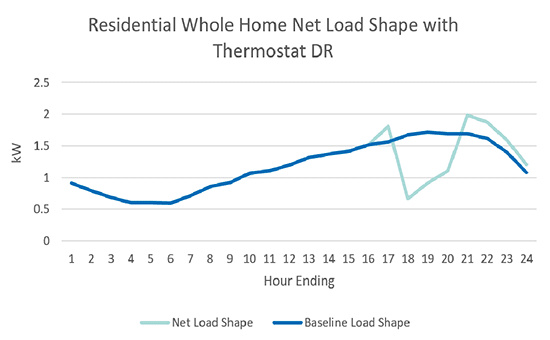PGE’s Rush Hour Rewards for Residential Customers
Posted on February 24, 2021 by Sudeshna Pal
Tags, Energy

A clean and affordable energy future can successfully materialize with active participation from utility customers. Demand response is a utility term for programs that allow a customer to get paid for adjusting their demand as an alternative to building new power plants or other generating resources. This blog describes how one such program will work. CUB has advocated for cost-effective and feasible demand response resources to be included in electric utilities’ resource portfolios via the Integrated Resource Plan (IRP) process.
Portland General Electric’s (PGE) Rush Hour Rewards is a demand response pilot program that encourages residential customers to limit their energy consumption during high demand hours by letting the utility take control of their smart thermostats. This is an ongoing rewards program that pays enrolled customers $25 each winter and summer for participating. The program allows PGE to change the customer’s smart thermostat set temperature by 1–3 degrees, reducing the load on its system during morning or afternoon hours on selected days in winter and summer respectively.
I signed up for this program last month after installing a NEST thermostat and learning about the program via the NEST app on my smartphone. The program enrollment takes two to three weeks, during which PGE determines the customer’s eligibility for the program by emailing a survey about the customer’s home heating and cooling system. Customers with a central air conditioner or a ducted heat pump or an electric furnace are eligible.
PGE held a winter Rush Hour Reward event on February 10. I received a notification on February 9, informing me that my home would be preheated so that PGE could bring down the temperature in my home from the usual set level between 7am and 10am. PGE had preheated my home to 71 degrees prior to that time window, and then brought it down to 66 degrees. (Since I set my thermostat at 69 degrees, this means that they warmed my house two degrees above my usual level and would allow it to fall three degrees lower than the normal level).
How would I rate my experience with this program? I would say I am quite satisfied. While there was an initial pause in communication from PGE and I was left wondering if I was able to sign up via my NEST app, the program started rolling eventually. The event did not interfere with my home comfort level, it gave me the flexibility of controlling my thermostat if I chose to, and most importantly, it helped me take a step forward in my energy conservation efforts.
How does a demand response program help the utility and its customers?

Graph provided by Portland General Electric.
The above graph depicts the impact of a summer Rush Hour event on a residential customer of PGE. By allowing the utility to control the thermostat during the highest demand hours (5pm to 8pm, or hours 17 to 19 on a 24-hour clock) on a really hot day in August, the customer was able to reduce their load on the system. The net load dipped down from the baseline level by more than two kilowatts as a result. If thousands of customers participate in this program, it will result in both energy and money savings for PGE’s customers in general.
As more and more customers enroll in demand response programs, we will be able to realize significant energy savings and there will be less need for the utility to make costly investments to accommodate peak loads on its system.
As a caveat, I would point out that programs like the Rush Hour Rewards critically depend on wi-fi service. This could potentially leave out underserved communities from participating in conservation efforts. As utilities expand these programs, they need to be available for all customers. This is one reason why CUB supports programs to provide universal broadband. CUB will keep you updated on the ongoing development of demand response programs, and continue to advocate for availability of these energy savings opportunities for all residential utility customers in future Integrated Resource Plans and Distribution System Plans.
To keep up with CUB, like us on Facebook and follow us on Twitter!





02/24/21 | 0 Comments | PGE’s Rush Hour Rewards for Residential Customers